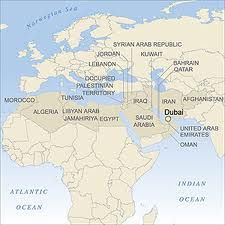Violence Sweeps Region As Arab Spring Creates New Arab Order – Analysis
By INEGMA
By Riad Kahwaji
Over ten months have passed since the so-called Arab Spring started in December 2010 and the wave of change sweeping the Arab world is far from over. Three regimes have thus far been toppled – Tunisia, Egypt and Libya – and two more are underway – Yemen and Syria. Scores of people took to the streets in most Arab capitals, cities and towns. The shockwaves were so strong that regimes in countries that did not see many demonstrations took preemptive moves in introducing reforms and welfare enhancement measures that managed to calm the streets. Jordan, Oman and Morocco embarked on a series of steps to become constitutional monarchies with stronger powers to the parliament, while the United Arab Emirates widened the voting base for its National Council and Saudi Arabia and Qatar raised wages and introduced generous welfare benefits to their peoples.
Most observers believe it will be at least five years before the “revolutions” or “uprisings” come to an end in the Arab world and we will see the actual features of the new Arab Order. But until then the Arab countries will witness a lot of disturbances, uncertainties and violence. The biggest causers of trouble are the ailing regimes themselves. Arab leaders who have been on seat of power for decades are not going to give up easily. They want to prove to the world that without them chaos and terror would spread everywhere. Most of all they want to play the card of the Islamists: If we fall radical Islamic governments will come to power and wreck havoc in the region. Events so far have uncovered much of the lies and myth these regimes had strived on. For one, the Islamic movement has played a little or modest role in toppling regimes in Tunisia, Egypt and Libya. Secular and leftists parties plus intellectuals played the leading role in the recent and ongoing uprisings.

The remnants of the deposed regime in Egypt embodied in the Supreme Military Council has actually formed an alliance with the Muslim Brotherhood in confronting the larger secular and leftist parties and are expected to work together in the coming elections. So the irony here is that the remaining members of the old regime are now in alliance with the Islamic forces it used to the scare the West with.
In Syria and Yemen, the regimes have resorted to the Al-Qaeda card to fend off internal and external pressures and retain legitimacy. Yemeni troops gave way to so-called thousands of Al-Qaeda members to occupy entire cities and provinces just to send a message to the international community that without me – the regime – Al-Qaeda will spread everywhere. Violence against unarmed civilians has been carried out by the loyal elements of the Yemeni military. Same and even worse in Syria where the regime and under the pretext of fighting Islamic militants and terrorists has been killing daily dozens of unarmed demonstrated demanding the ouster of the regime. The Syrian regime’s brutality has led to daily defections from the military and to the creation of the so-called “Free Syrian Army” that has started carrying out guerrilla warfare against the regime, threatening the country with a sectarian civil war between the pro-Syrian Alawite minority and the Sunni majority. Developments in Syria could impact security conditions in Lebanon, where Damascus has strong influence, and could possibly trigger a war on the Lebanese-Syrian front with Israel.
The Arab Spring has been very much about Arab individual’s integrity, dignity and rights. Chants of Arab demonstrators in all uprisings were not about Israel or Islam, but about freedom and democracy. Hence, the future Arab Order is expected to have a more democratic system, the thing that would make them closer to the values of the West than used to be under the past dictatorships. Even if some Islamic parties win a majority and come to power in some Arab countries, their democratic structure will make the states more prone to coexist with the West and globalization than the old regimes. The current Turkish model where an Islamic Party is running a secular state has proved to be appealing to most rising political forces in the new Middle East, and will likely be the norm. But until then, old regimes will spill a lot of blood and threaten a regional war just to stay in power few more decades. But odds so far have been against them and in favor of the peoples who broke the fear barrier and are thirsty for freedom.
Riad Kahwaji, CEO, INEGMA
This article appeared in the German online news daily ZEIT on Nov. 8, 2011.
